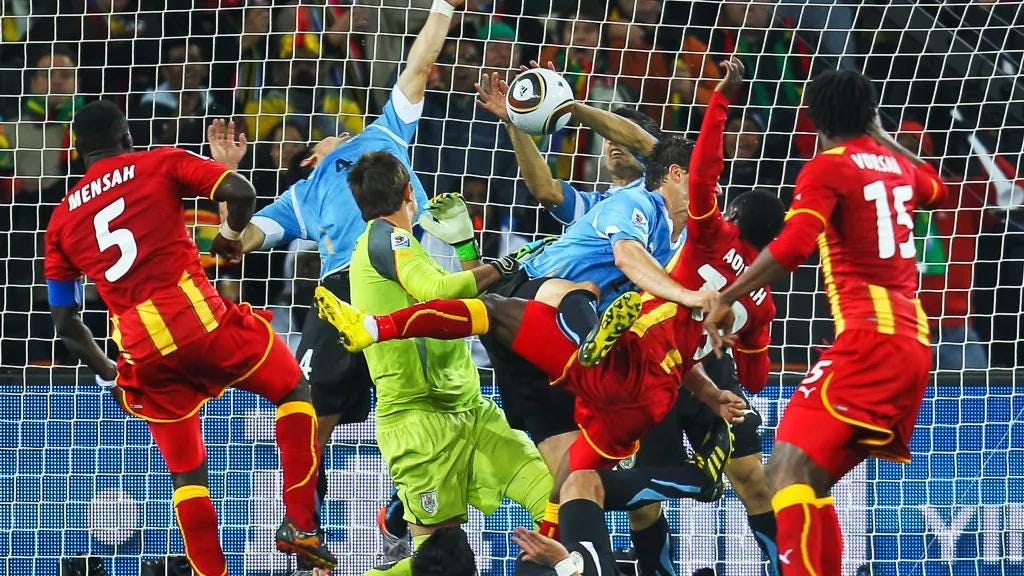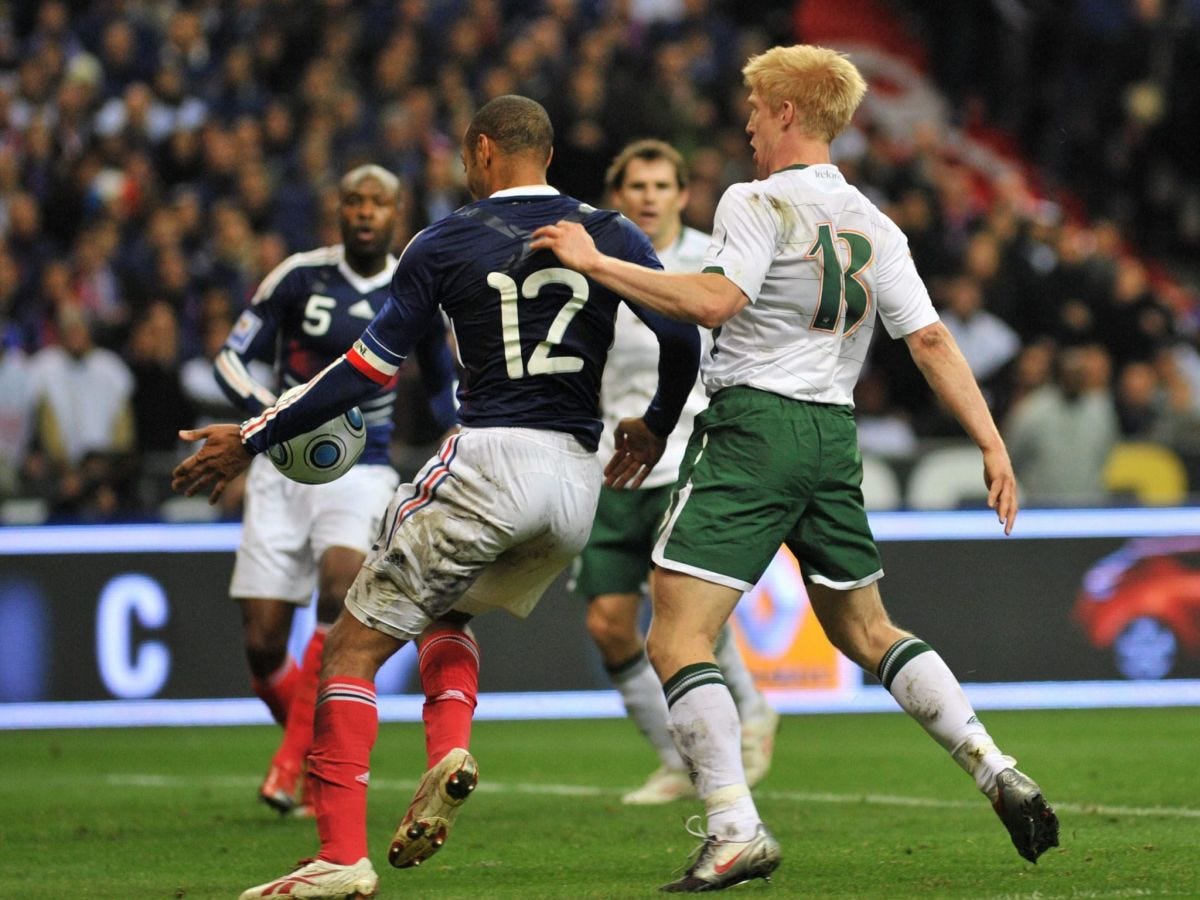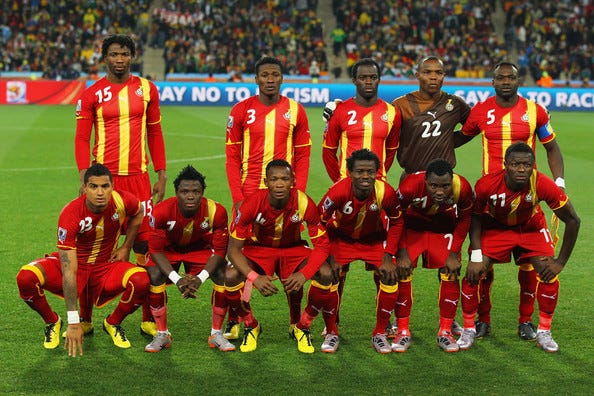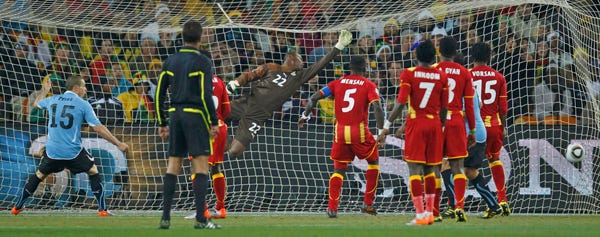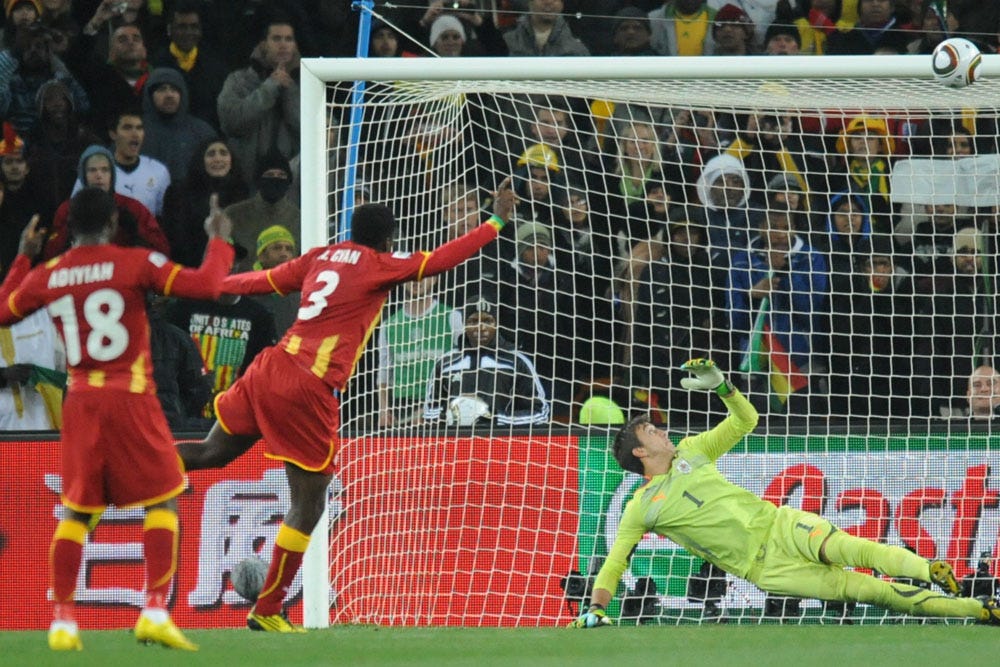"Today, any time I’m alone, it still haunts me"
Uruguay and Ghana’s quarterfinal meeting at South Africa 2010 is widely viewed as one of the most iconic World Cup matches in history. Why is the 2022 rematch filled with so much emotion?
Twelve and a half years on, the 2010 World Cup is remembered weirdly but fondly. Low-scoring games being played out to the constant cacophonous echo of the vuvuzela. It was a controversial World Cup, showing the best and worst that South Africa had to offer to some of the (mostly) Western visitors for the competition, with people from different nations being wonderfully welcomed by the South African people, while also having to deal with major issues of theft and poor security setups. Attention was also drawn towards the income inequalities between many South African residents, a “Beautification” of each host city through the destruction and elimination of the homes of thousands of shack-dwelling families, and the major financial cost that South Africa had to undertake to be able to host the tournament. After the World Cup, FIFA had made all the money, €2 Billion to be exact, while South Africa incurred losses of over €3.5 Billion.
The controversy wasn’t all off the pitch though. In the build up to the tournament, In the second leg of a qualification play-off match between France and the Republic of Ireland, French captain Thierry Henry, unseen by the referee and other match officials, illegally intentionally handled the ball twice in the lead up to the winning goal. Subsequently it was revealed that the Football Association of Ireland were paid €5 million by FIFA not to protest about the handball. During the tournament itself, in two Round of 16 matches, two incidents occurred that led to renewed debate over the lack of video technology in Football. Frank Lampard had a goal for England against Germany disallowed despite the ball having clearly crossed the line, and an Argentinian goal against Mexico was allowed despite being scored from an offside position.
This piece however, deals with a controversial moment that was picked up by the match officials. The perpetrator was immediately sent off and played no further part in the tournament. But his actions, even though he faced punishment for them, hang spitefully in the mind of every Ghanaian to this day.
History beckoned Ghana in the summer of 2010. Ghana arrived in South Africa for only their second World Cup ever, and boasting the youngest squad in the competition, with an average age of 23 years, 352 days. What the team lacked in experience, they made up for in fighting spirit and ambition. They had narrowly edged out Australia in their group to make it to the Round of 16. In that next round, Asamoah Gyan hammered home one of the goals of the tournament to send them past the USA into the Quarter-Finals. The Black Stars stood on the precipice of history, as the last remaining African side in the first FIFA World Cup to take place on African soil, Ghana faced the prospect of doing something no African team had ever done before - reaching the semi-finals. Much like the musings of Shakira, the performer at the head of this World Cup’s official song, it was Inevitable that This Time (was) For Africa. Ghana carried the hopes of an entire continent on its shoulders and did not shirk the responsibility set before them. They were ready for this, Whenever, Wherever.
Between Ghana and their objective was Óscar Tabárez’s Uruguay, spearheaded by an exciting attacking trio of Diego Forlán, Luis Suárez, and Edinson Cavani. Forlán and Suárez had played key roles as Uruguay topped Group A ahead of Mexico, hosts South Africa and France. It was the first time La Celeste had topped a World Cup group since the 1954 edition in Switzerland. Suárez continued his good form, scoring a brace in the round of 16 to help Uruguay beat South Korea 2-1. The game took place at Soccer City in Johannesburg, the same venue for the final of the competition. A thousand vuvuzelas created a wall of noise that spilled over the stadium walls and reverberated across the entire continent. Local fans began referring to the team from West Africa as “BaGhana BaGhana,” adapting the nickname of South Africa men’s national team – Bafana Bafana. Nelson Mandela sent a letter to the President of the Ghana Football Association and declared that ““The whole of Africa is behind Ghana. We want you to go on and win the World Cup.”
In keeping with the tournament thus far, this game was no classic. Heading into half-time it seemed both sides would be stepping into their dressing rooms without any real control over the tie. That was until the most unlikely of candidates stepped up to the plate. Suleyman Ali Muntari, known as “Sulley”, was not meant to be in this World Cup squad. The Inter Milan man had not been in the plans of Ghana manager Milovan Rajevac, after Muntari had previously been excluded from the national team due to disciplinary problems. He had purposefully missed an international friendly against Angola, been left out of the 2010 AFCON squad, he also snubbed a meeting with coach Milovan Rajevac to deal with his disciplinary issues. he would not have played at the World Cup had it not been for The GFA president, who in a recent interview with Joy Sports revealed he had to “kneel” in front of Rajevac to plead for Muntari to be included in the squad. Replacing suspended attacker André Ayew in the starting XI for the Quarter Final, in the 2nd minute of added time in the first half, the Internazionale midfielder unleashed a powerful shot from 35 yards which swerved away from Muslera and nestled in the back of the net. Now a player who was almost an outcast had sent the entire continent of Africa into raptures of ecstasy. Fifty-four African nations and their representatives from West Africa were just 45 minutes away from making history.
Ghana began the second half right where they left off, but it was Uruguay who scored against the run of play. Forlán stepped up, like he had multiple times this tournament already, and converted his fifth shot of the game after his brilliant free kick fooled Ghana goalkeeper Richard Kingson to bring Uruguay level. Forlán eventually won the top goalscoring award for the tournament, being the only player who seemed to be able to master the flight of the new Jabulani football which had caused numerous controversies throughout the tournament due to its design. From there, the game turned into a back and forth slog again. Two equally matched teams battled it out for supremacy. Ghana had the best chances, Uruguay had the majority of the ball, but nobody could take the opportunities that came to them.
This game was destined for extra-time, and for the second time this tournament, Ghana went in with no signs of slowing down. Extra-time flew by without either side creating a decent opening, until Ghana were awarded a free-kick on the edge of the box with just seconds remaining.
John Paintsil’s delivery was flicked on dangerously by Kevin-Prince Boateng. Muslera came out but didn’t gather as the ball came off Mensah’s head. The ball fell kindly into the path of Stephen Appiah, whose shot was cleared off the line by the shin of Luis Suárez. The rebound then cannoned off the grass before floating up into the air and onto the head of Dennis Adiyiah. Time stopped in the stadium as the ball seemed destined for the back of the net. It was destined for the back of the net. Nothing could stop it. The goalkeeper was out of position and had no chance to get to it. The header had been too powerful for anybody to get a foot, or a head, or their chest to it. There was one man on the line, striker Luis Suárez. Not for the first time in his life, Suárez acted as if possessed by some unknown being from the aether, and without hesitation he threw his arms up towards where the ball was headed, and smacked it away from the goal-line with a desperate expression across his face that feels all too familiar to the vast majority of people in this world when you stare closely at it for long enough.
Referee Olegario Benquerenca – a replacement for the initially appointed Howard Webb – brought an end to the pinball after he spotted the handball, pointed to the penalty spot, and immediately sent Suárez off. The Uruguayan received his marching orders, and his counterpart Asamoah Gyan received the chance to be a national hero. Gyan picked up the ball and placed it on the spot as history beckoned for the Black Stars forward, for all Africa. Since missing a penalty against the Czech Republic in 2006, the then 24-year-old had gone on to score all of his seven penalties for club and country including two before this at the 2010 World Cup. Gyan, with the weight of a continent on his back, went for power, but it was too much power, as his effort smashed the tip of the crossbar. The stadium went so quiet that all you could hear were the Uruguayan players chanting. An image flashed across the screen on replays of Suárez standing at the entrance to the tunnel, watching the penalty. He had gone off in floods of tears, jersey over his face. The next time the jersey came down below his mouth, his depression had turned instantly to elation as he spun around with the largest, toothiest of grins, fists clenched in the air. His split second decision had been vindicated, no matter how unsportsmanlike it was.
A penalty shootout followed, and it was Gyan who chose to take Ghana’s first penalty after Forlán had stroked home the opener. Whereas Stuart Pearce waited six years to find redemption for England in scoring a spot-kick against Spain at Euro 96, Gyan was not given much more than five minutes to collect himself. This time, he slotted past Fernando Muslera to set up a sequence that ended with Adiyiah, denied a second time, missing his penalty. Uruguay’s Sebastián Abreu rubbed Ghana’s noses in it, scoring the decider with a Panenka. Africa was crestfallen as Uruguay rejoiced.
Gyan’s redemption had lasted barely five minutes as he broke into understandable tears. Uruguay’s celebrations did not show much in the way of regret.
“Calling it cheating is too hard, it could have been a mistake,” said the Uruguayan manager, Óscar Tabárez after the game. It was an answer that defied credibility, almost as deeply as what had taken place during the match itself.
12 years and 6 months on, Ghana play Uruguay and Luis Suárez again in a game which will decide who progresses into the last 16 of the 2022 World Cup. In the lead up to the game, Suárez has made plenty of incendiary comments when asked questions about the handball. “The ‘Hand of God’ now belongs to me” and “I made the best save of the tournament”, and “I didn’t miss the penalty.” For Ghana, there is simply no game they would love to win more.
The game in 2010 haunts Ghanaian fans and players alike, but none moreso than the man that missed the penalty. "Today, any time I’m alone, it still haunts me," Gyan told TV3 Ghana a decade later. "Sometimes I feel like the world should go back again so I can redeem myself, but I know this is something that will haunt me for the rest of my life." While Gyan has said he has forgiven Suárez for his actions, he’s clearly in the minority. The Black Stars need revenge. They deserve revenge.


